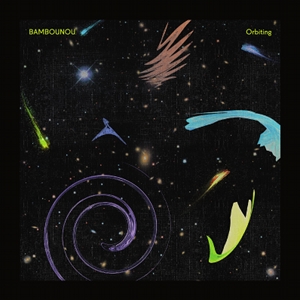Bambounou Orbiting
Bambounou‘s early releases—Animism, Cobe, “Night” b/w “Brawl,” and Fructose, with Joakim—didn’t necessarily set the Parisian […]

Bambounou‘s early releases—Animism, Cobe, “Night” b/w “Brawl,” and Fructose, with Joakim—didn’t necessarily set the Parisian producer (real name Jéremy Guindo-Zegiestowski) apart from his contemporaries, though Fructose was as quirky as one would expect from Joakim. His sound has its roots in the original dubstep-techno crossover, containing plentiful shades of artists like F or Dave Huismans. This sensibility is further coupled with the mutant juke and electro hybrids popularized by labels like Swamp81, 502, and 50Weapons, on which his debut LP, Orbiting, appears. Bambounou operates with a great deal of poise, and while the album bounces between two poles, its sturdy construction ensures a certain seamlessness.
Granted, there are a few almost archetypal missteps. As with so many dance producers tackling the album format, Bambounou feels the need to buffer his lengthier tracks with a series of interludes and short cuts. Few of these are necessary—the laid-back, boogie-ish synthwork on “Great Escape” even seems a little out of place, as the majority of Orbiting rests on a series of sharp, frenetic arrangements. That said, the ominous arpeggiations on “EX06” do form a fine midpoint, recalling similar patterns on Cobe‘s standout track, “Deepstaria.”
“Let Me Get,” the album’s only collaboration, features fellow Parisian French Fries and perhaps as a result is the only instance in which Guindo-Zegiestowski’s sound is at odds with itself. For a track based around the phrase “let me get that ass,” it’s more than a little overdramatic, and its searching, sentimental piano and synth lines would be better off soundtracking some kind of epic, Scarface-type saga. Even though many of the interludes are superfluous, “Let Me Get” comes from far below the album’s sphere.
Beyond this track, Orbiting is refreshingly gimmick-free. Bambounou plays with some familiar tropes, but executes them well. The radically broken “Any Other Service” is almost all breakdown, a piece for English radio DJs to drop mid-mix and talk over while hyping how “massive” it is (even though it sounds excruciating to dance to). There’s practically an entire micro-genre for these kinds of tracks, and many of them rely on the easy spectacle of sampled pop hooks. Guindo-Zegiestowski’s approach is comparatively bare-bones, reveling in the form’s abstraction. Like “Let Me Get,” “Mass” is laced with juke-style vocal chops, but instead of dictating the track’s mood, they perfectly slot into a spry, tightly stepping rhythm. Smartly, the producer maintains a rewarding focus on the drums throughout the LP. On the frantic technoid rush of “Data,” they’re a wooden, hollowed-out base for bleeping, repetitive synths; it’s a warehouse track simply because it’s robust enough to actually fill out a warehouse. “Off The Motion,” meanwhile, moves with a tensile, powerfully subby swing, perpetually uncoiling and regrouping. For “Splaz,” Bambounou smothers his kicks so they’re virtually little mounds, leaving plenty of headroom for glowing, filter-tweaked synth patterns.
By and large, Orbiting is bass music, and the album is accordingly armed with considerable low-end weight. Furthermore, the producer supplies it with little in the way of hooks—the synthwork generally provides ornamental foils for intricate, kinetic rhythms. In these respects, the majority of the LP is primed for DJ use. In spite of its spotty attempts at diversity, it might better be classified as a compilation than a proper album, since its flow drastically varies from track to track. But when a dance album cannot contain a grander narrative, the next best result is certainly a selection of floor-primed productions, and on this front, Orbiting delivers.

